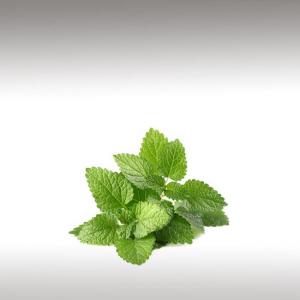
MELISSA ESSENTIAL OIL (MELISSA OFFICINALIS) - ESSENTIAL OILS

BASE / GENERAL DATA
Information submited: June 1, 2015 Modified: March 15, 2018 By: OperaDreamhouse
Botanical Name: Melissa officinalis
Common Method of Extraction: Steam distillation
Part Typically Used: Fresh flowering tops, leaves and stems
Color: Pale yellow
Consistency: Thin
Perfumery Note: Top / middle
Strength of Initial Aroma: Sweet, fresh and citrus-like smell.
Melissa officinalis, known as Lemon Balm, balm or Balm Mint, is a perennial herbaceous plant in the mint family Lamiaceae, native to south-central Europe, North Africa, the Mediterranean region, and Central Asia.
It grows to 70 - 150 cm tall. The leaves have a gentle lemon scent, related to mint. During summer, small white flowers full of nectar appear. The white flowers attract bees, hence the genus name Melissa (Greek for 'honey bee'). Its flavour comes from citronellal(24%), geranial (16%), linalyl acetate (12%) and caryophyllene (12%).
In mild temperate zones, the stems of the plant die off at the start of the winter, but shoot up again in spring. Lemon Balm grows vigorously and should not be planted where it will spread into other plantings.
In the 14th century it was included in tonic water made by the French Carmelite nuns and Paracelsus (1493 - 1541) called this herb "The Elixir of Life" while John Evelyn (1620 -1706) described it as "sovereign for the brain, strengthening the memory, and powerfully chasing away melancholy".
Besides Rose Otto, Melissa essential oil it is one of the most expensive therapeutic oils on the market today (pure therapeutic grade Lemon Balm oil or Melissa oil ranges in price from$150 to $225 for a 5 ml bottle).
Chemical structure:
The main chemical components aretrans-ocimene, cis - ocimene, 3 - octanone, methyl hepenone, cis-3 - hexenol, 3-octanol, 1 - octen - 3 - ol, copaene, citronellal, linalool, b - bourbonene, caryophyllene, a - humulene, neral, germacrene - D, geranial, geranyl acetate, d - cadinene, y - cadinene, nerol and geraniol.
Common Method of Extraction: Steam distillation
Part Typically Used: Fresh flowering tops, leaves and stems
Color: Pale yellow
Consistency: Thin
Perfumery Note: Top / middle
Strength of Initial Aroma: Sweet, fresh and citrus-like smell.
Melissa officinalis, known as Lemon Balm, balm or Balm Mint, is a perennial herbaceous plant in the mint family Lamiaceae, native to south-central Europe, North Africa, the Mediterranean region, and Central Asia.
It grows to 70 - 150 cm tall. The leaves have a gentle lemon scent, related to mint. During summer, small white flowers full of nectar appear. The white flowers attract bees, hence the genus name Melissa (Greek for 'honey bee'). Its flavour comes from citronellal(24%), geranial (16%), linalyl acetate (12%) and caryophyllene (12%).
In mild temperate zones, the stems of the plant die off at the start of the winter, but shoot up again in spring. Lemon Balm grows vigorously and should not be planted where it will spread into other plantings.
In the 14th century it was included in tonic water made by the French Carmelite nuns and Paracelsus (1493 - 1541) called this herb "The Elixir of Life" while John Evelyn (1620 -1706) described it as "sovereign for the brain, strengthening the memory, and powerfully chasing away melancholy".
Besides Rose Otto, Melissa essential oil it is one of the most expensive therapeutic oils on the market today (pure therapeutic grade Lemon Balm oil or Melissa oil ranges in price from$150 to $225 for a 5 ml bottle).
Chemical structure:
The main chemical components aretrans-ocimene, cis - ocimene, 3 - octanone, methyl hepenone, cis-3 - hexenol, 3-octanol, 1 - octen - 3 - ol, copaene, citronellal, linalool, b - bourbonene, caryophyllene, a - humulene, neral, germacrene - D, geranial, geranyl acetate, d - cadinene, y - cadinene, nerol and geraniol.

SPIRITUAL PRACTISES DATA

MEDICINE / HEALTH DATA

BEAUTY / COSMETICS DATA

FOOD / COOKING DATA
COMMENTS
No comments.


